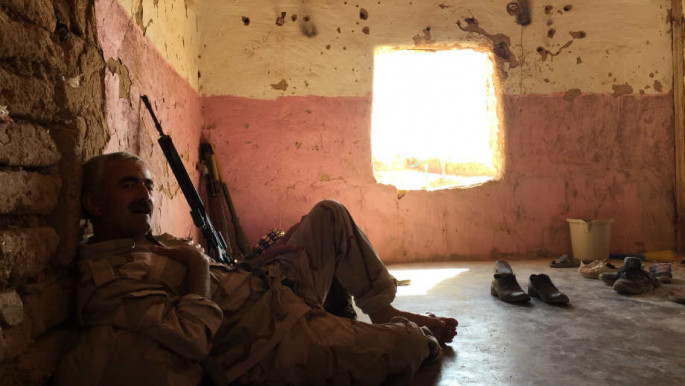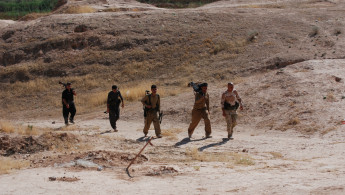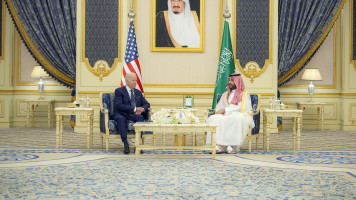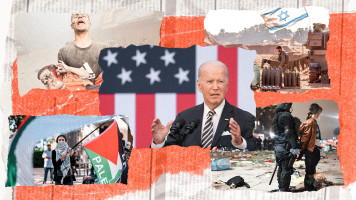Meeting the militias: 'Kurdish Volunteers' assemble to oust Iran-backed PMF
As the road winds deeper in the rugged and dry landscape of the outskirts of Tuz Khurmatu, we finally leave the asphalt and go through fields to reach a shack.
There we get a glimpse of those who call themselves "the Kurdish Volunteers", stationed a few kilometresfrom Tuz Khurmatu, from where they all originate. Poorly armed, with unmatched uniforms, they do not look like they would be able to oppose the mighty Iran-backed Hashd al-Sha'abi Popular Mobilization Forces (PMF) that took over their city last October.
We take a seat inside their base and start our interview. The fighters explain that their group was formed four years ago, initially to fight Islamic State group fighters who were closing on Tuz Khurmatu in their bid to expand their territory.
The spokesperson of the group, Hajji, has more of an honorific title than a superior rank in regard to his comrades. He and his group have taken part in every battle against IS around here since 2014, and played an important role in assisting the Peshmerga. Once IS was uprooted, they eventually turned their weapons against their new enemy: the Shia PMF militias now present in their city.
After the ultimatum given by the Baghdad central government to Kurdistan leadership to annul their independence referendum and withdraw from contested territories, Peshmerga forces abandoned Kirkuk and Tuz Khurmatu, and the area they controlled was shrunk by a third.
But the volunteer militias were not ready to abandon the city so easily. They fought on as long as they could, only to withdraw deep into Kurdish-held territory when there was no more hope of stopping the Shia militias.
"Those responsible for this treason should be hanged," Hajji tells us. A statement to which all here agree. The resentment towards the PMF militias is strong. But it is not as sharply felt as it is for the Kurdish leadership - especially those PUK leaders who unilaterally brokered an agreement with Baghdad.
The "volunteers" nevertheless draw a distinction between the political leadership and the military branch of the PUK and enjoy regular contact with the Peshmerga.
The Peshmerga forces cannot directly confront the Baghdad-allied PMF, nor can they afford to show too noticeable support for the Kurdish Volunteers. Their collaboration is therefore limited.
"We bought our own weapons. We haven’t received one single bullet from any Kurdish military force nor any support from any political party in Kurdistan," says Hajji.
 |
| Kurdish Volunteer spokesman Hajji takes a moment to relax [Rojbin Muslim] |
At least three foreign fighters - one American, two British - who fought with other Kurdish militias have attempted to join the group, but were asked to stay away. Peshmerga leaders did not want any foreigners to take part in their operations, as their presence might become an excuse for Baghdad and Shia militias to accuse the Kurds of collaborating with those they regard as "terrorists".
But although the Peshmerga formally deny any logistical support to the Volunteers, Hajji admitted that his group was about to engage in two weeks of military training under Peshmerga supervision.
Other Kurdish militias have established themselves in the outskirts of Tuz Khurmatu.
One of them, the Kurdish Liberation Army (KLA), has gained significant attention. "The KLA is established three kilometres away from here. We do not coordinate with them," Hajji claims. They are also formed of local fighters, but not all of them are from Tuz Khurmatu.
The leadership split from the Volunteers a while ago and the two groups have not cooperated much since.
"Only once did we have a joint operation together, when we simultaneously attacked a Hashd al-Sha'abi checkpoint that was established within Kurdish controlled territory," says Hajji. "Apart from that, we are not in touch with them. They stick to themselves and do not wish to form a coalition. We do not know where they get their equipment from, but they are better armed than us."
A local source claims the KLA is receiving support from a Kurdish political party, which would seem likely.
The other organisation that has stepped into the spotlight is the White Flag Group (WFG). But its reputation round here is less than stellar.
"We do not know who they are. We are not whatsoever affiliated with them or in touch with them anyhow. They operate in these parts, but we are not in contact with them," says the Volunteers' spokesman.
 |
There is a tacit agreement between all these militias that share a common enemy |  |
White Flag has been labelled an offshoot of IS, while some suspect it is also composed of former Ansar al-Islam fighters - a militant Islamist organisation based in the Hamrim mountains, a range of hills that spread across the region. This Salafi group merged with IS, although some of its units remained autonomous.
Local Sunnis seeking revenge against abusive Shia militias are also thought to have been drawn to the group.
"There is a tacit agreement between all these militias that share a common enemy," says a local source.
"It is a very sensitive issue, but all these groups with different agendas have agreed not to harm each other, but to target the Hashd al-Sha'abi instead. This does not mean that there is collaboration between them. The Peshmerga forces stationed in the area are behind this [agreement], but will never admit it. A Volunteer soldier told me he would put his life at stake by agreeing that was true."
Regardless of the details of any deal, the Kurdish militias are vastly outnumbered in their quest to reclaim Tuz Khurmatu from the Iraqi forces and their Iran-backed Shia proxies.
But the discrimination faced by the Kurds under the new rule of the PMF needs to be addressed if further bloodshed is to be avoided.
"We support the formation of a joint administrative body for the city," Hajji says. "But the Shia militias have to leave - and we will fight until this is achieved."
Rojbin Muslim is a pseudonym granted for their safety. They are a freelance journalist.



